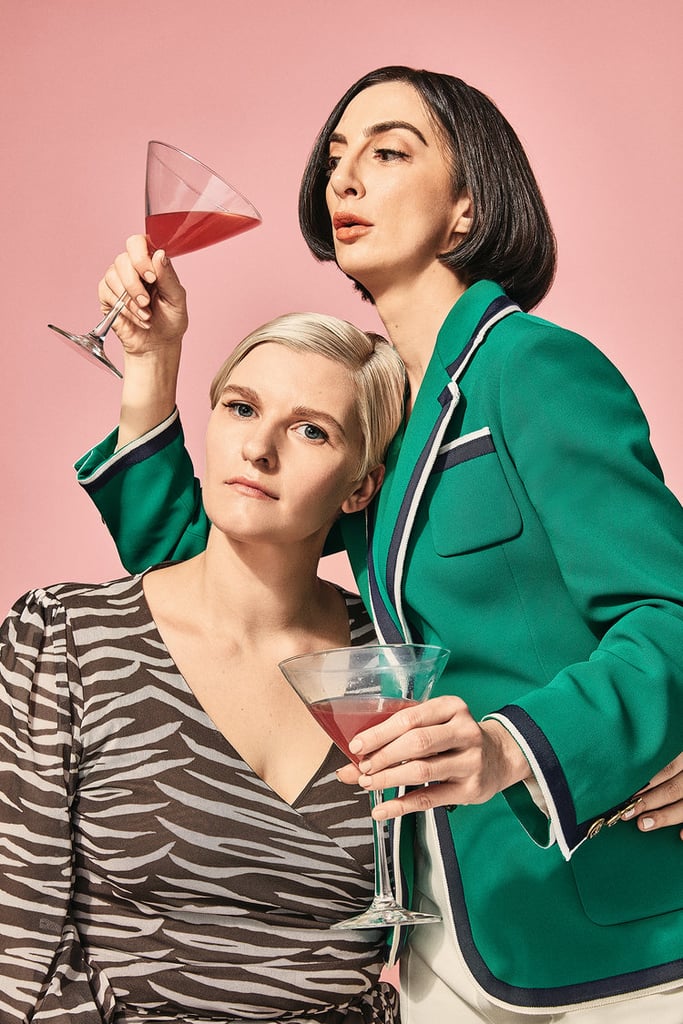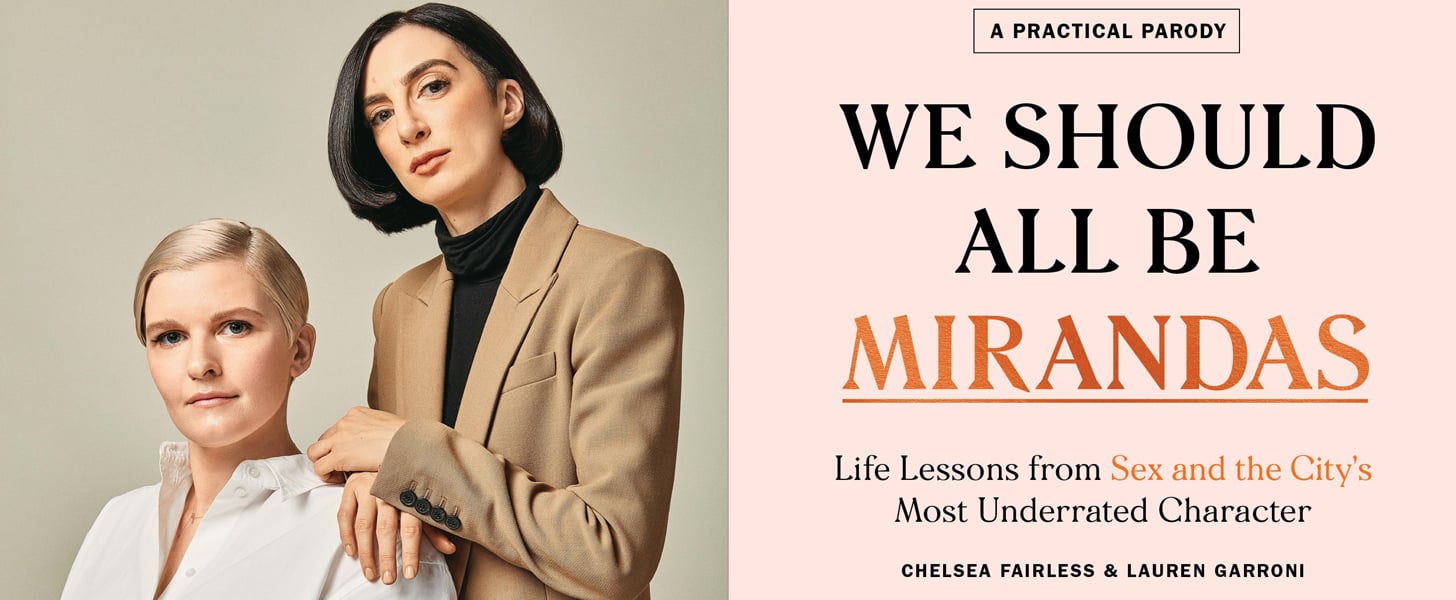
We Should All Be Mirandas Book Interview Quotes
These Instagram Sensations Are Making Sure Miranda Hobbes Gets the Hype She Deserves
Chelsea Fairless and Lauren Garroni are the brilliant minds behind the hit Instagram account Every Outfit on Sex and the City. In case you're not familiar, the feed is exactly what it sounds like — the college friends and former fashion editors revisit Sex and the City's best looks, adding their own hilarious and astute sartorial commentary on Carrie's "improbable chic" street style and using Charlotte's menswear-inspired ensemble to start a discussion on straight women wearing ties.
Since creating the account in June 2016 (while out at dinner, after a few "flaming margaritas," they told me), Fairless and Garroni have paid particular attention to the HBO series's resident realist, Miranda Hobbes. They post photos of her busy-businesswoman work wardrobe and give-no-f*cks off-duty aesthetic and praise her endless wit and pragmatic approach to work, sex, and love. It wasn't long before Every Outfit on Sex and the City caught the attention of the show's cast members, namely Cynthia Nixon (who played Miranda to perfection for six seasons and on the big screen). After coining the phrase "We Should All Be Mirandas" (a play on Dior's now-infamous "We Should All Be Feminists" t-shirt), Fairless and Garroni created their own merchandise around the slogan, with a portion of the proceeds going to a legal nonprofit. They were later invited to work on Nixon's gubernatorial campaign in 2018 and hosted a fundraising event called "An Evening of Miranda" with a guided look back at the character's best moments.
Now that Fairless and Garroni have become social media's de facto Hobbes historians, they're celebrating the character on a new level with the hilarious manifesto and lifestyle guide We Should All Be Mirandas: Life Lessons From Sex and the City's Most Underrated Character, available Oct. 15. The cheeky self-help-style book explores the magic of Miranda, offers up advice on how to channel her essence in your own life, and explains why fans of the show shouldn't be ashamed to identify with her character. If you recall, when Sex and the City premiered in 1998, it was nowhere near cool to declare yourself a Miranda (it's a condition that Fairless and Garroni have dubbed "Mirandaphobia"). But over time, it's become clear that what we first saw as rampant cynicism was Miranda's dedication to keeping it real, and what we initially perceived as a general disdain for love was actually a defense mechanism to avoid heartbreak and disappointment.
As a massive Sex and the City fan, getting to speak to Fairless and Garroni (pictured at right) on Aug. 27 was the highlight of my week. In addition to sharing stories about our Miranda-ness, we chatted about their wildly popular Instagram account and upcoming book, which they wrote for "every woman who has finally accepted she's more of a Miranda than a Carrie." If you're one of said women, welcome. Kick off your ridiculously high heels, slip into a pair of Gucci loafers, and join us.
POPSUGAR: Let me start by saying that I am a Miranda with a Carrie rising, and it's been a journey to work that out. I think we all remember the first time we decided we were a Carrie, but when did you each realize that you were actually more of a Miranda?
Chelsea Fairless: I think that for a lot of people, Miranda is an identity that you age into. Obviously, I always knew; I always related to Miranda even when I was younger. It wasn't until Lauren and I started the account, and we realized how positive the response was to posts about Miranda, that we fully embraced our identities.
Lauren Garroni: [I'm] a fellow Miranda with a Carrie rising. I think we always knew, but there was also a confluence of events around our starting the account. The 2016 election was happening, and it was seeing how Hillary Clinton — who is definitely a Miranda — was being treated by the media and others that made us reflect on how Miranda archetypes are not sufficiently valued in society. I think the second post we ever did is the overall and puffer jacket outfit because it amused us as fans. That was always such an outlier as an outfit, and we posted it and the response, even when we had a small [number] of followers, was so positive and so vocal that we were like, "OK, we think there's something here."
PS: How did you guys meet, and how did Every Outfit on SATC come to be?
CF: We met in college at Parsons. We were both in an interdisciplinary sort of department where we took a lot of fashion courses. Fast forward eight years and Lauren had moved back to LA. I was on the verge of moving back to LA, where I now live and, spoiler alert: we don't live in New York [laughs]. We went out for dinner one night, we had a few too many flaming margaritas, and we started the account at the table.
LG: Knowing what the account became and that it bequeathed a book as well, I wish that the origin was a more interesting story.
PS: I mean, that's a great origin. That's how most amazing ideas should start out, after margaritas. And the book?
CF: The [We Should All Be Mirandas shirts] caught on, and when Cynthia started her gubernatorial campaign about a year later, that phrase came back into the cultural lexicon. Our agent was like, "You should probably just figure out a concept for a book around this." So we did.We are people that enjoy reading self-help books, but then also hate ourselves because we're reading self-help books. So the architecture of the book has a lot of self-help speak; "Thrive like a Miranda, work like a Miranda." And when [we're] speaking about realizing you were a Miranda, it does have this connotation of the language around coming out as well — so that's why there's a section about Mirandaphobia.
PS: I have a theory that we might all start out as Carries, and then at some point, life turns us into Mirandas. Do you think that more women were Mirandas from the beginning and afraid to admit it, or do we become Mirandas as we get older?
CF: A lot of it has to do with what kind of woman is valued in society.
LG: It feels like everything has sort of come around, whether it's #ImWithHer, or women's coworking spaces. I think we got really lucky when we started the account — which was very randomly as a joke — because it coincided with a cultural reckoning and movement towards women's rights question mark [laughs] and was also a perfect nostalgia point for the late '90s and early 2000s. We're not only looking back on Sex and the City and loving it, but also reevaluating what we thought were good ideas 20 years ago.
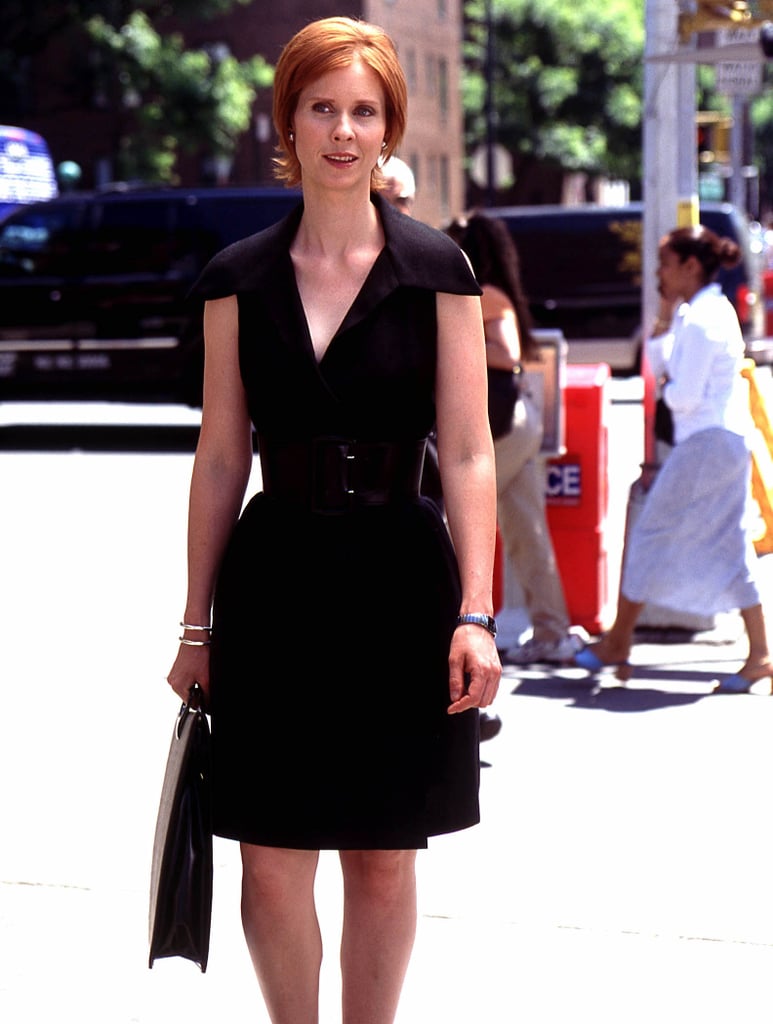
PS: Miranda is incredibly ambitious and driven — as you point out in the foreword, she's a Harvard grad who made partner and bought her own apartment by 35 — and her tenacity is such a component of the character. Even though you're both in more creative fields, how do you think your Miranda-ness has helped you grow in your own careers?
LG: I was born with a certain amount of Miranda-ness. I'm a type-A person, and I come from a type-A family as well. It's a blessing and a curse; [you're] able to see five steps ahead into the future and plan accordingly, but you become a little too cynical and think, "Well, here are all the things that could go wrong." That's why we wrote the chapter about letting your inner Charlotte pull you away from cynicism in those moments. Also, I'm overly organized. I just went on a vacation for a week, and there definitely was an Excel spreadsheet of the schedule.
CF: For me, it's less of the type-A stuff. I do enjoy and value working, and at the time there weren't a ton of TV characters who were that woman. Just having goals and enjoying what you do is a big part of it.
PS: I like that you touch on Miranda's workaholic tendencies in the book and give tips on keeping a healthy work-life balance. There were definitely scenes in the show that exacerbated that idea of, "Oh, she's so uptight; she only cares about her career!"
LG: I definitely think the show — at least in the very beginning — was playing into, but also responding to, the idea that women are either sluts or shrews. If you're a working woman, then you're a b*tch. You're shrewd. You're . . . what did Taylor Swift just say in that CBS Sunday Morning interview? "If you're a woman who plans, you're calculated. If you're a man who plans, you're strategic."
PS: This book really goes there when it comes to sex and dating advice. You have an entire chapter dedicated to "F*cking Like a Miranda," which I may have dog-eared and underlined just for personal reflection.
LG: When we set about writing the book, we said, "Oh, this will be a tongue-in-cheek play on the show." But the show went off the air 15 years ago, so certainly things in regards to work, dating, and every element of life have changed. The voice — especially in the sex and dating chapters — is imbued with a lot of our own philosophy. In many parts, we're taking stuff from the show and updating it as two Mirandas who've been in the world as millennials.
PS: Why do you think Miranda's approach to sex is so relatable?
LG: Well, first of all, Miranda just had the most humiliating sexual experiences. We imagine that most of the people who are reading [the book] are millennials like us and were watching the show when way too young and thinking, "Oh, that poor Miranda!" Then when you get older, you're like, "Oh, no. Sex is less Samantha and more Miranda — awkward and weird."
CF: And disgusting, et cetera. That's the reality of sex sometimes, especially when you're figuring it out and, as we say in the book, also in your 30s.
PS: Thank you for the advice, by the way. It's brilliant.
CF: We didn't know we had so much advice until we started writing.
LG: We went into it like, "Haha, this will be so funny," and then by the end, there was a catharsis.
CF: Because, you know . . . we have learned things.
LG: That's a great pullquote for your article: "Creators of viral Instagram account have learned things."
"We're not only looking back on Sex and the City and loving it, but also reevaluating what we thought were good ideas 20 years ago."
PS: Back to this idea about the rising sign — I love that you included a flow chart that helps you figure it out. One of the best things about these characters is that even though you may "be" one, you can always have elements of another. What about the other girls do you relate to?
CF: I relate to everyone but Charlotte, really. I enjoy the character, but there's very little of her that I relate to. I can relate to Carrie's love of fashion, and to her romantic outlook and impractical qualities. If it's Samantha, I relate to her humor, her assertiveness, and her world view.
PS: It's funny that you mention not relating to Charlotte, because a few of the women in the office got "Miranda with a Charlotte rising" and were, like, disgusted with themselves.
CF: I don't think it's bad to be a Charlotte! Definitely not.
PS: I can maybe see how being a Charlotte might not be as appealing in 2019, but it's interesting to me how many people I know that are ashamed to identify with her. I've told my friend for years that she's a Charlotte, and she just refuses to accept it. I'm like, "But look at how much gingham you own!"
CF: Is that our follow-up book? You're a Charlotte, and That's OK. [laughs] I think a lot of people say, "I'm a Carrie," when they're not actually Carries. Like, nothing about the way they live their lives is Carrie.
LG: We all want to be in the echelon of true It girls; you think of Grace Jones, or Edie Sedgwick, or Chloë Sevigny, or Tessa Thompson . . . of the moment. They can be created through superior styling, but a true It girl is who everyone wants to be, and not everyone is, and that is OK.
PS: What I've gotten from this book is that being a Miranda with a Carrie rising is actually quite dangerous.
CF: It's a very dichotomous experience. I wrote the definition for the Miranda with the Carrie rising . . . that is me. You know, it's tortuous; you know you should be saving money and sometimes you do, and then — like me yesterday in Paul Smith — you see a tuxedo suit that you just have to have.
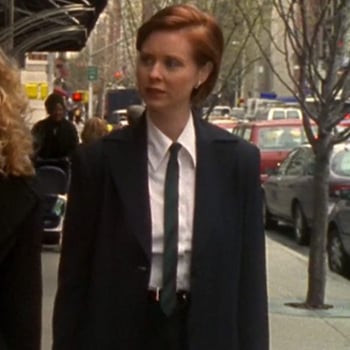
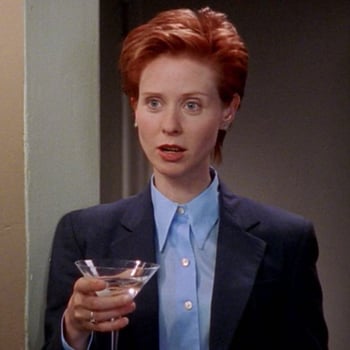

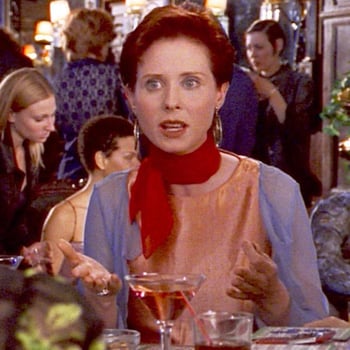
PS: Miranda was really onto something with her looks, even though we may have shaken our heads at the time. If you had to pick a favorite of hers, which would it be?
CF: I don't know what episode it is [Ed. note: it's season one, episode four], but it's one of her most androgynous outfits; she's wearing a skinny black straight tie and a kind of, like, slightly oversized suit. She's just walking down the street talking to Carrie about something. It's very David Byrne.
PS: Right. Yes. I think that was one of the first couple of episodes.
CF: It's all about the early seasons for Miranda; season two for me, mostly.
LG: They do impress upon her an increasingly heteronormative style as the seasons go on, which has its place. She looks amazing in the second film, which I guess at some point we're going to be forced to acknowledge, but.
PS: I think her most standout looks are definitely earlier on in the series. At the time, we were like, "Why is she wearing that?" And now, we see it — she has great style! Has looking back on all the looks for Instagram influenced your style today?
CF: Not so much. If anything, the way Carrie was styled influenced me as a teenager back when the show was on. You know, I'd wear the flower brooch . . . it was awful. No one should dress like Carrie Bradshaw except for Carrie Bradshaw.
LG: You keep referencing this, but pics or it didn't happen, Chelsea.
CF: It's, I don't, I . . . This was like pre having a camera on your phone. But everything on Sex and the City is so in fashion; the early 2000s are what everyone is dressing like now, so it all looks very contemporary.
PS: Random, but do you guys think Miranda would be on social media? Because I could picture her hate-scrolling through mommy blogger accounts or something.
CF: She would definitely do that.
LG: She was always an early adopter of technology, as we saw in the show, so she definitely would be on Twitter first. If the show was still on today, I feel like Miranda would've definitely gone viral for yelling at someone on the NYC subway for man-spreading or something.
PS: That's so true. I could also see her possibly running for local office, as Cynthia Nixon did.
LG: I see that too. City comptroller, and then you bring John Slattery back.
PS: So, last question: why do you think we should all be Mirandas?
LG: I feel like it's the only way to stay sane in this increasingly insane era.
PS: Great answer.
CF: Yes, it's the ultimate self-care tip for 2020, is what I'm going to say.
LG: Exactly. Exactly.
We Should All Be Mirandas: Life Lessons From Sex and the City's Most Underrated Character is available Oct. 15.
